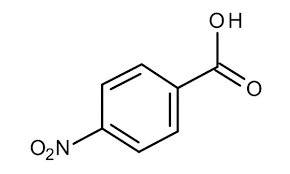HI! I’M ELEMENT AI.
Nitrobenzoic Acid

Product Description
Nitrobenzoic acid, known for its distinctive nitro group attached to the benzene ring, plays a crucial role in various industrial and chemical synthesis processes.
Product:
Nitrobenzoic Acid
CAS:
62-23-7
Synonym:
4-Nitrobenzoic acid; Nitrodracylic acid
Structure:

Typical Characteristics
Appearance
Yellow crystalline powder
Density
1.610 g/cm3
Melting point
242 °C
Molecular Weight
167.12
Purity
98%
Refractive index
1.6280
Uses, Applications & Markets
Key applications
Markets
get a quote
We Offer Nitrobenzoic Acid
in various grades
A few of the grades available are listed below:



Nitrobenzoic Acid used in many
industry applications
Nitrobenzoic acid, known for its distinctive nitro group attached to the benzene ring, plays a crucial role in various industrial and chemical synthesis processes. Its applications include:
- Chemical Synthesis: Used as an intermediate in the synthesis of dyes, agrochemicals, pharmaceuticals, and other organic compounds, nitrobenzoic acid is pivotal in creating compounds with specific desired properties.
- Pharmaceuticals: It serves as a building block in the production of several drugs, contributing to the synthesis of analgesics, anti-inflammatory agents, and other medication classes.
- Dyes and Pigments: Nitrobenzoic acid is employed in the manufacture of azo dyes and pigments, which are widely used in textiles, inks, and plastics for coloring purposes.
- Corrosion Inhibitors: Certain derivatives of nitrobenzoic acid are effective as corrosion inhibitors in industrial applications, helping protect metals from corrosion in aqueous environments.
- Research Chemical: In academic and industrial research labs, nitrobenzoic acid is often used as a reagent or precursor in the study of chemical reactions, synthesis methods, and material science developments.
- Herbicides: Some nitrobenzoic acid derivatives have applications in agriculture as herbicides, providing an effective means of weed control.
- Catalysts: It can also act as a catalyst or co-catalyst in various organic reactions, enhancing the efficiency and selectivity of chemical processes.